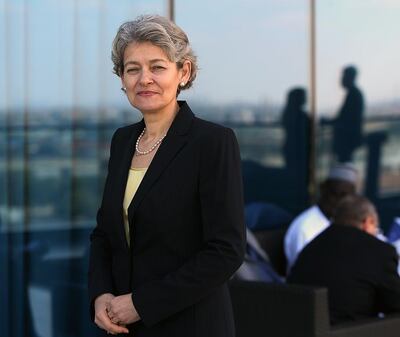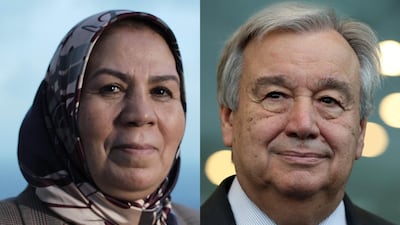Nominations have opened for the 2022 Zayed Award for Human Fraternity.
The prize recognises people all over the world who are committed to promoting peaceful coexistence.
Only certain people can submit names for the award, including a member of government and/or a current or former head of state, a member of parliament, the president of a supreme court, a member of the Higher Committee of Human Fraternity or a university president, among others.
Those they nominate must be an individual or collective who has made “outstanding contributions” in promoting the principles and values of human fraternity.
The winners will be selected by a panel of judges.
member of the Higher Committee of Human Fraternity
Irina Bokova, a member of the Higher Committee of Human Fraternity, and a former director general of Unesco, told The National the prize is “not just another award”.
“Because there are many awards that are given in the world for different things, but there is no award, apart from the Zayed Award for Human Fraternity, that is given for compassion, for solidarity, for mutual respect, for being part of a common human family,” she said.
The award was created after the Document on Human Fraternity was signed by Pope Francis and Dr Ahmed Al Tayeb – the Grand Imam of Al Azhar – in Abu Dhabi, in February 2019.
This year’s winners were Latifah Ibn Ziaten, founder of Imad Association for Youth and Peace, who reached out to young people after losing her son to an act of terrorism, and Antonio Guterres, the ninth secretary general of the United Nations.
The award aspires to be a broader version of the Nobel Peace Prize, Ms Bokova said.
“We have this ambition; we are not hiding it. The Nobel Prize of course is already very well established and prestigious. We want to open the space a little bit larger.
“Humanity is at a crossroads," she said, pointing to huge advancements in technology and connectivity.

Technology has brought people closer together, she said, but it is not necessarily true that people have become more tolerant or respectful of each other.
“So this is where I think the award can play a hugely important role as a non-political approach, but more coming to our hearts and what makes us human at the end of the day.
“We need it in this world.”
A new jury has been appointed to select the 2022 winners, Ms Bokova said.
The six new jurors include former heads of state, a UN chief and a Vatican official, who will be responsible for choosing the 2022 award winners at meetings in the Vatican and in Abu Dhabi.
They are:
Phumzile Mlambo-Ngcuka, the UN under-secretary general and executive director of UN Women.
Jose Ramos Horta, a Nobel laureate who previously served as president of East Timor from 2007 to 2012. He was awarded the Nobel Peace Prize in 1996 for his work to resolve the conflict in East Timor.
Cardinal Michael Czerny, the under-secretary of the migrants and refugees section of the Holy See's dicastery for promoting integral human development.
Mahamadou Issoufou, president of Niger from 2011 to 2021.
Dr Leah Pisar, the chairwoman of Project Aladdin, which works to counter violent extremism, anti-Semitism and anti-Muslim bigotry and to foster dialogue with the Muslim world at large.
Judge Mohamed Abdelsalam, the secretary general of the Higher Committee on Human Fraternity and a judge at the State Council of Egypt.


